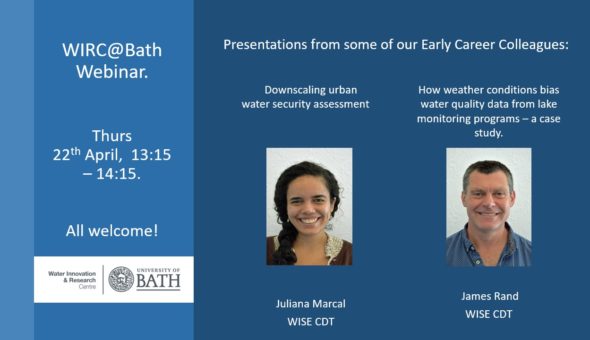This event has now been CANCELLED.
This January sees the next talk in the monthly 'Water Colloquium' series organised by WIRC @ Bath exploring the breadth of water research being undertaken at the University of Bath and beyond.
When: Thursday 18 January 2018 at 1.15pm
Where: Room 3.19, Building 4 East, University of Bath (Location and maps)
Note: This event is free and open to all.
A wall of water: advanced hydraulic modelling for flood risk analysis (Ioanna Stamataki)
In this research, flash floods are of particular interest as they are a destructive natural hazard with one of the highest mortalities. They remain a global problem and due to their dynamic nature combined with their limited spatial and temporal scales, observation and accurate modelling of these events continues to be a challenge. This presentation will explore the theoretical background of selected numerical methods used to model extreme events such as flash floods and present a case study, the 2004 Boscastle flash flood, used both for the experimental and numerical modelling. Experimental work undertaken in UCL will be described and experimental results showing the evolution of water levels, the loads and forces acting on downstream settlements and the velocity of the flow will be presented. Finally experimental and numerical results will be compared and further numerical developments and expected outcomes will be discussed.
On farm anaerobic digestion of manures and crop residues: challenges and opportunities (Mariano Marinari)
Conventional wisdom is that the use of Anaerobic Digestion (AD) for energy and nutrient recovery needs to take place at large scale systems. Some case studies from the UK and Europe suggest that anaerboic digestion of manures and crop residues is economically viable at smaller scale with a more distributed approach. Despite the fact that manure is the most abundant substrate for AD, it is still underutilised in the UK. AD has the potential to reduce the GHG emissions of the livestock industry in addition to the production of renewable energy. Moreover, with the rise of the number of installations of anaerobic digestion systems in the last ten years, farmers have become familiar with digestate providing a higher value fertilizer compared to raw manure, leading to improved crop yields and increased nutrient uptake. With appropriate application methods and timing, research suggests that digestate applications might reduce nutrient losses from fields compared to raw manure applications in the long term. This project aims to explore the scale of operation, regional opportunity and economics of anaerobic digestion of manure and crop residues. A GIS tool has been developed as a basis for geo-spatial analysis of biomass resources and to create a land use dataset based on the Agricultural Census. An Excel-based design and optimisation tool is used to simulate different scenarios of on farm anaerobic digestion of manures and crop residues.
Assessment and mitigation of stormwater runoff in informal settlements (Olivia Cooke)
One of the biggest global health problems today is that posed by urban conditions, most significantly in developing countries. Within informal settlements the lack of infrastructure including sanitation and sewage facilities can generate serious problems for health and the environment. It is necessary to understand the processes and characteristics of runoff to mitigate health risks from storm runoff and improve sanitation. This research is examining how anthropogenic and environmental factors influence stormwater runoff quality and quantity during storm events in a South African settlement and improving the understanding of the links between the hydrology, geochemistry and microbiology of runoff. This presentation will discuss the fieldwork undertaken in Stellenbosch over the past two summers including the site selection based upon catchment analysis, data collection within the informal settlement and the methods of analysing water quality (geochemical and microbiological components) and water quantity (hydrological component). Results and analysis of the date collected will also be presented and discussed.
Contact: Please email Sarah Eliot if you need any further information.
Respond

